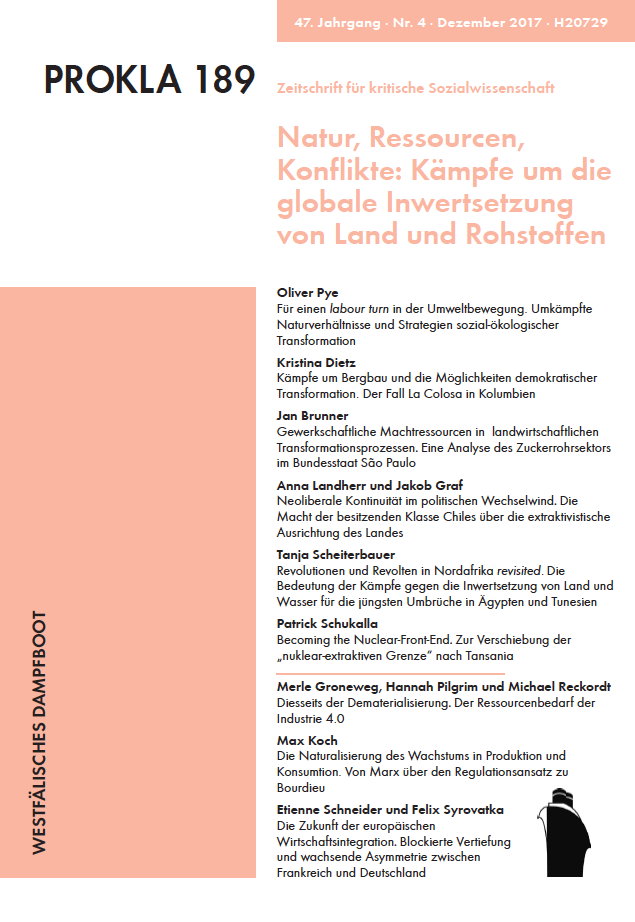Becoming the Nuclear-Front-End
On the postponement of the "nuclear-extractive boundary" to Tanzania.
DOI:
https://doi.org/10.32387/prokla.v47i189.59Keywords:
Tanzania, Nuclear-Energy, Africa, power-plants, East-AfricaAbstract
Uranium mining often escapes the attention of debates around the nuclear industries. The chemical elements’ representations are focused on the nuclear reactor. The article explores what I refer to as becoming the nuclear front – the uranium mining frontier’s expansion to Tanzania, its historical entanglements and current state. The geographies of the nuclear industries parallel dominant patterns and the unevenness of the global divisions of labour, resource production and consumption. Clearly related to the developments and expectations in the field of atomic power production, uranium exploration and the gathering of geological knowledge on resource potentiality remains a peripheral realm of the technopolitical perceptions of the nuclear fuel chain. Seen as less spectacular and less associated with high-technology than the better-known elements of the nuclear industry the article thus aims to shine light on the processes that pre-figure uranium mining by looking at the example of Tanzania.
Downloads
References
abc (2006): Paladin Banks on Africa. Interview Transkript (02.04.2006). URL: http://www.abc.net.au/insidebusiness/content/2006/s1606504.htm, Zugriff: 9.9.2017.
ABNNewswire (2016): Deep Yellow Limited (ASX:DYL) Executive Interview with Managing Director Greg Cochran (15.09.2016). URL: https://www.youtube.com/watch?v=INWgUgmfgx8&t=192s, Zugriff: 9.9.2017.
Alexis‐Martin, Becky|Davies, Thom (2017): Towards nuclear geography: Zones, bodies, and communities. In: Geography Compass 11(9): 1-13. https://doi.org/10.1111/gec3.12325
Barry, Andrew (2013): Material politics: Disputes along the Pipeline. Malden-Oxford. https://doi.org/10.1002/9781118529065
Berkemeier, Molly u.a. (2014): Governing Uranium in the United Kingdom. DIIS Report 2014:02. URL: https://www.diis.dk/files/media/publications/import/extra/rp2014-02_uranium_uk_cve-mfl_web_2.pdf, Zugriff: 9.9.2017.
Brand, Ulrich/Wissen, Markus (2017): Imperiale Lebensweise. Zur Ausbeutung von Mensch und Natur in Zeiten des globalen Kapitalismus. München.
Conde, Marta/Kallis, Giorgos (2012): The global uranium rush and its Africa frontier. Effects, reactions and social movements in Namibia. In: Global Environmental Change 22 (2012): 596-610.
https://doi.org/10.1016/j.gloenvcha.2012.03.007
Cook, Helen (2015): Fuel supply to new nuclear power projects. Power Point Präsentation von Helen Cook, Senior Associate bei Shearman & Sterling LLP. World Nuclear Fuel Cycle Conference, Prag, 22.4. 2015.
Deutscher Bundestag (2011): Antwort der Bundesregierung auf die Kleine Anfrage der Abgeordneten Ute Koczy, Sylvia Kotting-Uhl, Hans- Josef Fell, weiterer Abgeordneter und der Fraktion BÜNDNIS 90/DIE GRÜNEN - Drucksache 17/5858 -Herkunft des Urans in deutschen Atomkraftwerken. (01.06.2011) URL: http://dipbt.bundestag.de/doc/btd/17/060/1706037.pdf, Zugriff: 9.9.2017.
Garcier, Romain (2009): The nuclear 'renaissance' and the geography of the uranium fuel cycle. In: Geography 94(3): 198-206.
Harvey, David (2005): Der neue Imperialismus. Hamburg.
Hecht, Gabrielle (2011): Introduction. In: Hecht, Gabrielle (Hg.): Entangled Geographies. Empire and Technopolitics in the Global Cold War. Cambridge/MA-London. https://doi.org/10.7551/mitpress/9780262515788.001.0001
- (2012a): Being Nuclear. Africans and the Global Uranium Trade. Cambridge.
- (2012b): An elemental force: Uranium production in Africa, and what it means to be nuclear. In: Bulletin of the Atomic Scientists 68: 22-33. https://doi.org/10.1177/0096340212440352
- (2014): Invisible production and the production of invisibility: Cleaning, maintenance, and mining in the nuclear sector. In: Kleinmann, Daniel/Moore, Kelly (Hg.): Routledge Handbook of Science, Technology, and Society. New York: 353-368.
IAEA (2012): Nuclear Fuel Cycle Information System. About Nuclear Fuel Cycle. URL: https://infcis.iaea.org/NFCIS/About.cshtml#, Zugriff: 9.9.2017.
James, T.C. (1958a): Report on the second United Nations International Conference on the peaceful uses of atomic energy. Geological Survey of Tanganyika. Report No. TCJ/63.
James, T.C. (1958b): Report on: Symposium on uranium and thorium in Africa. Geological Survey of Tanganyika. Report No. TCJ/60.
Khlopkov, Anton; Chekina, Valeriya; Vestergaard, Cindy (2014): Governing Uranium in Russia A country report on Russia's growing demand for natural uranium. DIIS Report 2014:19. URL: https://www.files.ethz.ch/isn/185558/diisreport2014-19.pdf, Zugriff: 9.9.2017.
Kuletz, Valerie (2001): Invisible Spaces, Violent Places: Cold war nuclear and militarized landscapes. In: Peluso, Nancy Lee/Watts, Micheal (Hg.): Violent environments. Ithaca-London: 237-260.
OECD (2006): Nuclear Development Forty Years of Uranium Resources, Production and Demand in Perspective. "The Red Book Retrospective". URL: https://www.oecd-nea.org/ndd/pubs/2006/6096-40-years-uranium.pdf, Zugriff: 9.9.2017.
Pitkanen, Laura; Farish, Matthew (2017): Nuclear landscapes. In: Progress in Human Geography https://www.doi.org/10.1177/0309132517725808: 1-19.
Masco, Joseph (2015): The age of fallout. In: History of the Present (5): 137-168. https://doi.org/10.5406/historypresent.5.2.0137
Mez, Lutz; Schneider, Mycle (2009) Renaissance der Atomkraft? Vermutlich nicht! In: PROKLA 39(3): 425-440. https://doi.org/10.32387/prokla.v39i156.423
Moore, Jason (2015): Capitalism in the web of life. London-New York.
Neumann, Roderick (2001): Disciplining peasants in Tanzania: From state violence to self-surveillance in wildlife conservation. In: Peluso, Nancy Lee/Watts, Micheal (Hg.): Violent environments. Ithaca. London: 305-327.
Nixon, Rob (2011): Slow violence and the environmentalism of the poor. Cambridge/MA-London. https://doi.org/10.4159/harvard.9780674061194
Nuclear for Climate (2015): Nuclear is part of the solution for fighting climate change. URL: http://www.sfen.org/sites/default/files/public/atoms/files/nuclear4climate_position_paper.pdf, Zugriff: 9.9.2017.
Schumacher, Friedrich; Thamm, Nikolai (1941): Die nutzbaren Minerallagerstätten von Deutsch-Ostafrika. Mitteilungen der Forschungsstelle für Kolonialen Bergbau an der Bergakademie Freiberg. Berlin.
Schneider, Mycle u.a. (2016): World Nuclear Industry Status Report 2016. URL: https://www.worldnuclearreport.org/The-World-Nuclear-Industry-Status-Report-2016-HTML.html, Zugriff: 9.9.2017.
Squassoni, Sharon u.a. (2014) : Governing Uranium in the United States. A Report of the CSIS Proliferation Prevention Program. URL: https://csis-prod.s3.amazonaws.com/s3fs-public/legacy_files/files/publication/140228_Squassoni_GoverningUranium_WEB.pdf, Zugriff: 9.9.2017.
Townsville Daily Bulletin (1947): Uranium found in British mandated Territory (21.1.1947).
Vestergaard, Cindy (2015): Governing Uranium Globally. DIIS Report, 2015:09. URL: https://www.stimson.org/sites/default/files/file-attachments/DIIS_RP_2015_09_web.pdf, Zugriff: 9.9.2017.
Weszkalnys, Gisa (2015): Geology, potentiality, speculation: on the indeterminacy of "first oil". Cultural Anthropology 30(4): 611-639. https://doi.org/10.14506/ca30.4.08
Wissen, Markus; Naumann, Matthias (2008): Die Dialektik von räumlicher Angleichung und Differenzierung: Zum uneven-development-Konzept in der radical geography. ACME: An International E-Journal for Critical Geographies, 7(3): 377- 406.





